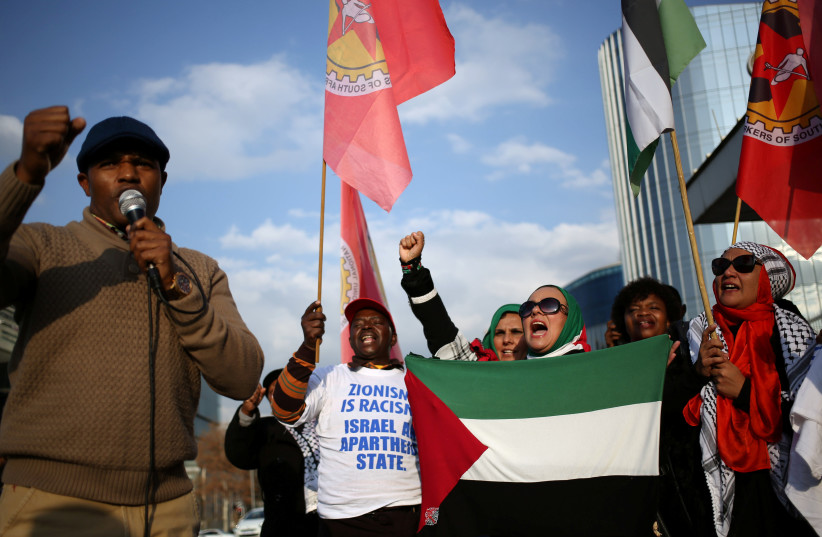The South African government defended its limited relations with Israel as a way to help the Palestinian cause, following criticism for accepting the credentials of new Israeli Ambassador in Pretoria Eliav Belotsercovsky.
The criticism reached such a pitch from activist circles and within the ruling African National Congress (ANC) Party that the South African Foreign Ministry released a lengthy statement explaining its policy toward Israel.
“The Department of International Relations and Cooperation has noted comments and questions regarding the status of diplomatic relations between South Africa and Israel,” the statement reads.
South Africa withdrew its ambassador from Israel as part of a process of downgrading its diplomatic presence, and has not reinstated one since then, the ministry’s spokesman Clayson Monyela explained. It has been a consistent supporter of “the struggle of the Palestinian people in their struggles against occupation.”
“Our country draws a direct parallel between the former apartheid regime and the Israeli occupation of Palestinian land. Like the Non-Aligned Movement (NAM), we consider Palestine, together with Western Sahara, as unfinished decolonization struggles,” Monyela wrote.

The message also quotes former South African president Nelson Mandela as saying, “We know too well that our freedom is incomplete without the freedom of the Palestinians.”
It did not mention that Mandela also affirmed “the legitimacy of Zionism as a Jewish nationalism,” and called on Arab leaders to “make an unequivocal statement that they recognize the existence of Israel with secure borders”.
South Africa’s Foreign Ministry also boasted of being “instrumental in stepping up pressure on the government of Israel,” including in pushing for international determinations of whether Israel is an apartheid state in the UN and the International Court of Justice. The statement cited reports by Human Rights Watch and B’Tselem accusing Israel of apartheid.
“The situation is dynamic and South Africa will ensure that its diplomatic presence is strategic and geared towards ending the occupation,” the statement added.
After South Africa accepted Belotsercovsky as Israel’s ambassador, the South Africa BDS (Boycott, Divestment and Sanctions) coalition tweeted that it was “ashamed of SA Pres shaking hands with representative of apartheid while Israeli government intensifies ethnic cleansing in Palestine.” The ANC favors an anti-Israel stance, including boycotts, and media outlets accused South African President Cyril Ramaphosa of “shameless hypocrisy.”
South African Zionist Federation chairman Rowan Polovin, however, saw Belotsercovsky‘s arrival as an opportunity for relations between the countries to grow stronger.
“We ask the SA government to tone down its anti-Israel rhetoric and become pragmatic as to how our country can benefit from positive relations with Israel and all she has to offer. Nor does our government need to be ‘anti-Israel’ in order to show support for ordinary Palestinians,” Polovin wrote. “South Africa ought to place itself in the center of peaceful and productive Israeli-Palestinian relations, and not at the periphery where it is unable to be an effective mediator.”
Meanwhile, Pretoria has continued its push, together with Algeria, to remove Israel from its observer status in the African Union, where South Africa’s influence looms large.
The vote is expected to take place on Thursday, as part of the African Union Executive Council in Addis Ababa, with heads of state in attendance. Two-thirds of the 54 member states of the African Union would have to support the motion for Israel’s observer status to be revoked.
A diplomatic source in Jerusalem on Sunday said he was optimistic that Israel has the votes it needs, and an African diplomatic source agreed with the assessment.
The source said there is a high likelihood the vote will be postponed, because Senegal, which just took over the presidency of the AU, would not want to be responsible for bringing such a sensitive topic to the fore. Other countries support a postponement, the source said, because the AU makes the vast majority of its decisions by consensus, and the vote on Israel’s status would be divisive.
The Israeli Foreign Ministry’s deputy foreign minister for Africa visited Addis Ababa and Senegal, among other African countries, to promote Israel’s position in the vote, the source said.
The Foreign Ministry declined to comment at all on the African Union vote.
Israel rejoined the African Union as an observer last July, when commission chairman Moussa Faki Mahamat announced the move, supported by current African Union chairman Democratic Republic of the Congo President Felix Tshikedi. While Mahamat had the authority to do so unilaterally, he believed he had majority support when he gave Israel the status, a diplomatic source said.
Since then, 21 AU member states have protested the move, though many were specifically opposed to being presented with facts on the ground without a discussion. Eleven out of 54 AU member states do not have full relations with Israel. Several of those 11 have understandings with Israel, such as Djibouti, which allows Israeli ships to pass through its waters.
The AU was founded in 2002, with Israel as an observer. Israel was ousted from the AU in 2003 in a campaign spearheaded by the late Libyan dictator Muammar Gaddafi.
